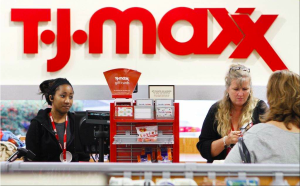By Alex Plough February 27, 2015
Inside the Walmart Supercenter in Albany, the largest Walmart in the United States. ©Matt H. Wade. Licensed under CC BY-SA 3.0 via Wikimedia Commons.
Walmart Wage Hike
Global retail giant Walmart, the largest private employer in the U.S., announced last week plans to increase wages for all its US workers to at least $10 an hour by next year.
The increase will be incremental. Roughly 500,000 full-time and part-time employees currently getting minimum wage will get a pay raise to $9 an hour starting this April. The rate will then climb to $10 an hour in February of next year. The current federal minimum wage is $7.25 per hour.
The voluntary pay raise helps diffuse criticism from labor activists who have long campaigned against Walmart’s low wages and anti-union stance. But it won’t silence all of Walmart’s critics. On Wednesday Reuters reported that a major shareholder, the Connecticut Treasurer Denise Nappier, is trying to force the company to link executive compensation to a measure of “employee engagement.”
An improving US labor market has created increased competition for good workers and labor experts say firms like McDonald’s Corp now have few options but to begin raising hourly wages to attract qualified staff.

Dorian Bowens (left) and Sharon Black, cashiers at the T.J. Maxx in Frederick, Maryland.
© Bill Ryan/The Gazette
Last month the coffee shop chain Starbucks raised its starting wage, while healthcare firm Aetna announced that it would start paying its most junior workers $16 an hour starting in April.
After years of stagnant wage growth in the US, economists and politicians are hoping that as the largest private employer in the US, Walmart has set a floor for wages that other major employers will be forced to match. It appears to be working. On Wednesday the fashion retailer TJX Companies, owner of the TJ Maxx chain, said it would also raise the pay of its US workers to at least $9 an hour by April.

This is what a wallet used to look like. © Oliver Schöndorfer
Google Wallet Goes Mobile
On Monday search engine giant Google announced a partnership with several US wireless companies to pre-install its electronic payment app, Google Wallet, onto Android smartphones starting later this year. The carriers partnering with Google include AT&T Mobility, T-Mobile USA and Verizon Wireless.
The mobile application stores credit or debit card information on a smartphone and allows its users to pay for items by tapping their device on a custom terminal that an increasing number of retailers are installing in stores.
All consumer-facing businesses see mobile payments as the next major trend in shopping and Google is determined to catch up with Apple, whose own mobile payment service Apple Pay is rapidly gaining market share. Google faces the added challenge of corralling a fractured coalition of wireless carriers, banks and payment networks to roll out a new version of Google Wallet.
This is no mobile phone. ©Pixabay
Unlike Apple, which closely controls both the hardware and software of its devices, Google lets smartphone makers develop their own versions of its Android operating system and allows them to pre-install custom third-party applications. Each player in Google’s coalition has its own priorities, which often come into conflict with Google’s ambition to rival Apple Pay.
The South Korean electronics-maker Samsung, which sells the most Android smartphones in the world, is developing its own rival payment service using technology from its recently acquired LoopPay Inc.
Visa’s European arm raised the stakes this week with the announcement of a new technology protocol to make it easier for consumers to make secure payments to retailers via their smartphones, lifting one of the last stumbling blocks for Apple Pay in Europe.
Businesses Prepare to Capitalize on Cuba-US Thaw
The softening of relations between Cuba and the US has business owners on both sides of the Gulf of Mexico eyeing new markets for expansion.
Cuban cigar-maker Habanos S.A., based in Havana, expects to grab around a quarter of the high-end US cigar market if the superpower drops its 50-year-old embargo against the Communist country.

Cuban cigars. Licensed under CC BY-SA 2.5 via Wikimedia Commons.
A a 50-50 joint venture between the Cuban state and Imperial Tobacco Group PLC, the Cuban firm monopolises the domestic cigar business and predicted that in only a few years it would capture up to 70% of the vast US cigar market.
With the company’s 2014 revenues at $439 million and the US cigar consumption at $70 to $90 million a year, an end to the embargo would represent a windfall for Habanos S.A and the Cuban state.
Jorge Luis Fernandez Maique, commercial vice-president of Habanos S.A, reassured reporters at Cuba’s annual cigar festival that he would preserve the quality of the Cohibas, Montecristos and Romeo y Julietas cigars that are famous around the world.
Across the water, Florida-based catamaran builder Brian Hall hopes to launch a high-speed ferry service between the two nations as soon as the end of the year. Hall is one of half a dozen Florida companies planning to seek ferry licenses from the U.S. Treasury Department’s Office of Foreign Assets Control (OFAC), which enforces sanctions. Last year some 650,000 people visited Cuba from the United States, a figure some experts predict will race past 1 million in the next few years as travel restrictions ease.
Stolen Cash to Cuba
Havana Cathedral. ©Akasenn Own work. Licensed under CC BY-SA 3.0 via Wikimedia Commons.
The decades of official antagonism between Cuba and the US has spawned a darker trend in the movement of goods and people between these former Cold War rivals.
American laws designed to encourage anti-Communist Cubans to flee the country have created a pipeline for Cuban crooks to send more than $2 billion in stolen cash back to their home country over a 20-year period, according to a year-long investigation by the Florida-based Sun Sentinal.
The journalists uncovered widespread criminal abuse of the Cuban Adjustment Act of 1966, which allows Cubans to enter the US without visas or background checks as well as letting them return home without jeopardizing their status.
Social Mobility Math
Compared to the ‘Old World’, America has historically been a beacon of social mobility where anyone who works hard can turn their rags into riches. But does this myth still hold true in today’s increasingly unequal society?
To answer the question, the New York Times took a detailed look at a recent study into income mobility in the US. With a series of data-rich interactive applications, readers can compare county-by-county the probability that a child raised in the bottom fifth income bracket will rise to the top fifth.
The fascinating and detailed analysis reveals stark geographic differences and as well as the critical effect that parents’ salaries have on their child’s future earnings. In short, the chances of pulling yourself up by your bootstraps are much lower than you may think.
****
Alex Plough is a freelance business journalist based in New York. Originally from London, England, he has a background in data-driven investigative reporting and has worked on a number of agenda-setting projects such as the award winning Iraq War Logs for the Bureau of Investigative Journalism. More recently he graduated from Columbia Journalism School’s masters program, business and economics reporting concentration, as well as Columbia’s Lede Program – a three month course designed to apply the tools of computer science to journalism. He is particularly interested in the overlapping fields of finance, technology and how young people are shaping the new American economy.
This entry was posted on Friday, February 27th, 2015 at 9:00 am. It is filed under Week in Review and tagged with Apple Pay, Cuba-U.S. relations, Cuban cigars, Google Wallet, minimum wage, walmart. You can follow any responses to this entry through the RSS 2.0 feed.
Comments are closed.
